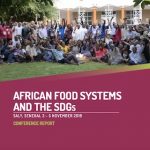In response to the open consultation on the report and recommendations of the Task Force Rural Africa
Now is the time for Agroecology
May 2019
This African civil society statement is in response to the Open consultation on the recommendations of the Task Force Rural Africa, in their report “An Africa-Europe Agenda for Rural Transformation.”
We welcome this opportunity to contribute to the definition of EU priorities in its relations with Africa in the agriculture and food sector. We welcome the spirit of continued cooperation and sustainable investment by Europe, Africa’s main trading partner. We welcome the comprehensive analysis of the issues by the Task Force of renowned experts. We welcome the report’s recognition that the rural economy is the driver of poverty reduction and the engine of growth. We welcome the shift in emphasis from large scale corporate agriculture towards family farming as the driver of agricultural development. We welcome the recognition of Africa’s huge diversity and consequent need for context-specific locally driven solutions. We welcome the appetite for transformation and the adoption of a food systems approach. These are all to be welcomed as progressive and enlightened steps in the right direction.
We agree that a sustainable transformation of African agriculture is our shared goal, but we see in this report a missed opportunity to step up to address the big issues facing Africa, primarily the corporate capture of our food systems, and the damage this is doing to our environment, our soils and lands, our biodiversity, our nutrition and health, and our food sovereignty. Closely linked is climate change, already a living reality for many millions of African farmers, pastoralists and fishers, as droughts, rangeland degradation and ocean temperature rises threaten livelihoods and weaken food security. We affirm that agroecology is a solution to both.
We urge the Task Force, and the European Union, to listen to the voices of African food producers – farmers, fishers, pastoralists – and avoid the risk of jumping to adopt, promote and impose false technical solutions.
While the executive summary of the report speaks only of ‘sustainable agricultural intensification’ we see from the full report that this includes a host of dangerous and contentious technologies that African Civil Society has resisted for many years.
Chapter five of the report notes that the Green Revolution (GR) package of intensification based on improved seeds, chemical inputs (fertilisers, pests and weeds control) and mechanisation, led to negative environmental impacts, excessive use of fossil fuels and resources, costly inputs and technologies. The report calls for alternatives but we see that the alternatives proposed do little to challenge the business-as-usual GR approach.
We are not convinced by the proposed “eco-technical pathway” which the report claims will promote “simultaneously the rational use of biotechnology with modest external inputs, irrigation and mechanisation compatible with the ecological cycles.” We have heard such terms before, and consign them to the list of falsesolutions alongside climate smart agriculture, carbon capture, geo engineering, and indeed sustainable agricultural intensification. We see these not as genuine solutions but merely attempts by corporate actors to secure and legitimize their control of our food systems.
Most of all, we take issue with the report’s failure to recognise the value of agroecology. We stand in solidarity alongside many millions of African food producers and consumers across the continent who are united in support for agroecology as the sustainable future of farming. In many ways, agroecology is the antithesis of current conventional, corporate-driven, monoculture-based agricultural systems. Where conventional agriculture seeks to simplify, agroecology embraces complexity. Where conventional agriculture aims to eliminate biodiversity, agroecology depends on diversity, and builds upon it. Where conventional agriculture pollutes and degrades, agroecology regenerates and restores, working with nature – not against her.
We endorse the report’s recognition that it is important to identify answers adapted to local context and to include farmers in the search for responses to the relevant challenges. Let that inclusion begin here.
We challenge the Task Force and the European Commission to ensure the EU lives up to its commitments to sustainable development goals, to climate action and to phasing out fossil fuels. It’s time to make the leap away from failed and false solutions, and get behind Agroecology for Africa. Agroecological systems keep carbon in the ground, rebuild soil fertility and increase yields, merging cutting edge science with farmers’ local knowledge. Agroecology builds resilience, helping farmers adapt to the effects of climate change. We challenge the EU to support small-scale African food producers, so many of them women, to build a sustainable, resilient, diverse, healthy, productive, and culturally appropriate food system for Africa.
_________________________
The Alliance for Food Sovereignty in Africa is a broad alliance of civil society actors who are part of the struggle for food sovereignty and agroecology in Africa. These include African food producer organizations, NGO networks, indigenous people’s organizations, faith based organizations, women and youth groups, and consumer movements. Its members represent smallholder farmers, fisher folk, pastoralists, hunter/gatherers, indigenous peoples, faith-based institutions, and consumers across Africa.
AFSA member organisations
- African Biodiversity Network (ABN)
- African Centre for Biodiversity (ACB)
- Association Ouest Africaine pour le Développement de la Pêche Artisanale (ADEPA)
- Biodiversity and Biosafety Association Kenya (BIBA)
- Coalition pour la Protection du Patrimoine Génétique Africaine (COPAGEN)
- Comité Ouest Africain de Semences Paysannes (COASP)
- Comparing and Supporting Endogenous Development (COMPAS Africa)
- Eastern and Southern Africa Small Scale Farmers Forum (ESAFF)
- Eastern and Southern Africa Pastoralist Network (ESAPN)
- Fahamu Africa
- Farm-Saved Seeds Network (FASSNET)
- Fédération Agroécologique du Bénin (FAEB)
- Fellowship of Christian Councils and Churches in West Africa (FECCIWA)
- Friends of the Earth Africa (FoEA)
- Global Justice Now!
- Groundswell West Africa (GWA)
- Health of Mother Earth Foundation (HOMEF)
- Indigenous Peoples of Africa Coordinating Committee (IPACC)
- Institut Panafricain pour la Citoyenneté, les Consommateurs et le Développement (CICODEV Africa)
- Institut Africain pour le Développement Economique et Social (INADES-Formation)
- International Tree Foundation (ITF)
- JeunesVolontaires pour l’Environnement (JVE International)
- John Wilson
- La Via Campesina Africa (LVC Africa)
- Network of Farmers’ and Agricultural Producers’ Organizations of West Africa (ROPPA)
- Participatory Ecological Land Use Management (PELUM) Association
- Plate-forme Régionale des Organisations Paysannes d’Afrique Centrale (PROPAC)
- Réseau Africain pour le Droit à l’Alimentation (RAPDA –Togo)
- Rural Women’s Assembly (RWA)
- Tanzanian Alliance for Biodiversity (TABIO)
- Thousand Currents
- Union Africaine des Consommateurs (UAC)
- We are the Solution / Nous Sommes la Solution
- World Neighbors
- Zambia Alliance for Agroecology and Biodiversity (ZAAB)
Additional signatories
- Agricultural Policy Network (Kenya)
- Biowatch South Africa
- Caritas Zambia
- Cultivate!
- EcoNexus
- Growth Partners Africa
- Iles de Paix
- Institute for Agriculture and Trade Policy-Europe (IATP-Europe)
- Kenya Food Alliance
- Seed and Knowledge Initiative
- Southern and Eastern Africa Trade Information and Negotiation Institute (SEATINI)
- SWISSAID
- The Society for International Development (SID)
Download a copy of the declaration here

































